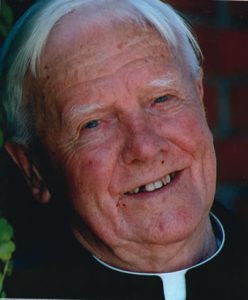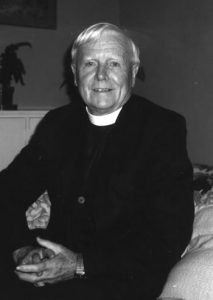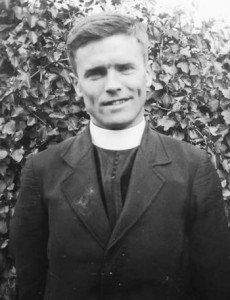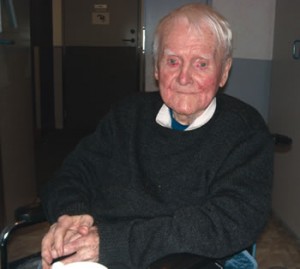George Henry Duggan – the man, the myth
by Lyndsay Freer
On 3 July, well-known Marist priest and “defender of the faith” Rev Dr George Duggan SM celebrates his 100th birthday.
Regarded as one of this country’s eminent theologians and educators, Fr Duggan (affectionately known by his confreres and former students as “Chalky”) enjoyed a long career as a teacher, lecturer and author of books and articles and a prodigious number of letters to editors in publications around the English-speaking world.
George Duggan was born in Runanga near Greymouth. He was educated by the Mercy Sisters and Marist Brothers in Greymouth and Reefton, and his secondary education was at St Bede’s College, Christchurch, where he was dux in both 1927 and 1928. He won a University National Scholarship in 1928, the first St Bede’s student to do so.
His ordination as a priest of the Society of Mary took place in Rome on 7 March 1936, the feast of St Thomas Aquinas, an auspicious date, given his future dedication to the works of St Thomas Aquinas which informed much of his later teaching and writing.
In the 1930s there was a need in New Zealand for more qualified people to teach philosophy and theology, and because of his outstanding academic abilities he was sent to Rome in August 1933 to undertake a 4-year course in theology at the Angelicum, the university attended by his uncle, Rev Dr Rasmussen SM, in the early 1920s. He gained a Doctorate in Sacred Theology (STD) from the Angelicum with a Magna Cum Laude (“with great praise”), and his thesis, published later with the imprimatur of Cardinal McKeefry of Wellington, was The Church in the Writings of St John Fisher.
As a dedicated Thomist he wrote many decades later that the Church was quite clear in its Canon Law that the lecturer must stick faithfully to the teaching of St Thomas. “I had no difficulties about that,” he wrote, “because the man was a genius. Not only that; he is right. Pope John Paul II said that St Thomas was to be praised because of his enduring originality. I say: ‘Your Holiness, I’m sorry, but I disagree. St Thomas is to be esteemed not because of his originality but because he is right’ .”
In addition to his academic interests, sport was another of his enthusiasms. He opened the batting for St Bede’s First XI, and was regarded as a “handy front-rower” in the College First XV. One of his students some decades later recalls that Fr Duggan often used the hand language of cricket umpires to illustrate his lectures, and even in the years after his ordination, he was prepared from time to time to augment the various boys’ teams that needed reinforcement.
Fr Duggan has many fascinating tales to tell of a long and interesting life, particularly of his experiences following the great Napier earthquake in 1931 when along with other seminarians he went to Greenmeadows to assist with the tragic and devastating aftermath on the community there. He compiled a large photographic collection of his years of study in Rome. At that time all young men living and studying there, regardless of their nationality, were required to join the Fascist youth movement, which in the case of students like George Duggan was merely a token requirement. Among his many mementos is his Fascisti membership card dated 11th June 1937.
In addition to receiving much acclaim for his scholarship, Chalky Duggan was no stranger to controversy. “He was the most gentle, pastoral and compassionate of men and an outstanding spiritual director. But with a pen in his hand he became a veritable warrior in defence of the faith,” were the words of a former Provincial of the Society of Mary, Fr Denis O’Hagan, when asked for his impressions of his former professor.
Dr Duggan was a regular and generally controversial correspondent to the letters columns of The Listener. Prominent writer and social commentor, Monty Holcroft, who was the Listener’s editor from 1949 wrote of him. “For years I had been receiving strongly-reasoned letters defending conservative positions on politics and religion from G.H. Duggan, and I imagined a stern person, but when I met him I was surprised to find he was small cheerful clergyman with rather large eyes”.
Another of his former students said that he was one of the most human of the seminary professors. A long time friend, when asked to record her memories of Fr Duggan, wrote that among many other qualities, what struck her was his non-judgmental, charitable, conciliatory attitude in all circumstances. “He was always the same,” she wrote, “always even-tempered, diplomatic, and a good listener with great respect for the person facing him.”
His friend, Fr Brian Quin SM, describes him as a modern example of John Bunyan’s Mr Valiant-for-truth. “All his priestly life he has been noted for his forthright defence of Church teaching,” he wrote recently. “In this, he has shown an exemplary sense of the Marist commitment to loyalty and to the teaching authority of the Church.”
Fr Quin went on to note the difference between the public face of the man, who could be pretty sharp at times in written comment, and the private Fr Duggan who was known to his many friends, students and colleagues as a wonderfully sympathetic and kind spiritual director, and also a lively and interesting conversationalist.
 A reading of his countless published letters shows that while he was critical of views and opinions which he regarded as not authentically Catholic, he was careful for the most part to confine his comments to issues rather than to personalities.
A reading of his countless published letters shows that while he was critical of views and opinions which he regarded as not authentically Catholic, he was careful for the most part to confine his comments to issues rather than to personalities.
Fr Rick Loughnan, the Vicar General of the Christchurch Diocese, smilingly recalls a story told by his late father, Peter Loughnan, who was at St Bede’s with George Duggan. “My father was batting at cricket and one of his balls hit George on the head. He fell unconscious, and was taken to hospital, but fortunately recovered quickly. Dad often said that thankfully he did not deprive the Church of Chalky’s gifts, but wryly observed that he may have been partly responsible for the discomfort of those who felt the cut and thrust of his pen.”
One well-known theologian wrote in a New Zealand Catholic journal. “I readily admit that Father Duggan is highly skilled in the dialectician’s ability to argue. I myself have little taste for controversy; perhaps a Thomist ought to be more prepared for controversy than I am, and to that extent I am indeed a poor Thomist.” This priest went on to present what he believed to be his own more humane interpretation of Thomistic philosophy, but continued, “Father Duggan, for his part, seems to approach every issue with the mentality of a chemist coming to the dining table, dipping litmus paper into every sauce to test it for acidity.”
Certainly Chalky was known to make an occasional astringent comment of his own. He began a review of a book entitled ‘New Wineskins’ with these words: “Remembering the Gospel parable, readers will be looking in the new wineskins for new wine. What they will find is cyanide.”
His academic interests were not confined to matters of faith and doctrine. He was also interested in political and social issues, and his views were clearly defined by his theological perspectives. Topics of his books, articles and letters ranged across widely diverse subjects from social policy to Modernism, new catechetics, evolution, clerical celibacy and sexual morality to critiques of the writings of Lloyd Geering, Teilhard de Chardin and Hans Küng, among others.
Those who worked and lived with Fr Duggan over the years have many affectionate stories to tell about his charm and kindness as well as his little eccentricities. Not only was he a stimulating companion, but he was also quite handy to have about the house when relaxing away from his academic pursuits. One of his interests was to buy large quantities of fruit from local orchards either to give away or to make jam, much of which was given away to friends and neighbours. A Taradale electrician recalls that Fr Duggan held the record for destroying the greatest number of elements when he became distracted and allowed jam to boil over. He remembers replacing three new elements in one season alone.
In his seventy six years of priesthood Chalky Duggan has had no fewer than twenty seven appointments, including positions in parishes, colleges, the Marist seminary, as Master of Rochester Hall in Christchurch and Master of Second Novices at Maryknoll, Greenmeadows. He is the last remaining of the children of his parents Teresa and George Duggan. His brother Chris, who died in 1996 was also a priest in the Society of Mary.
The New Zealand Provincial of the Society, Fr Brian Cummings, said that as one of Fr Duggan’s former students he has had the benefit of his theological expertise. “Fr Duggan, as has always been the case, continues to be very loyal to the Society of Mary and very conscious of his identity as a Marist,” he said. “He is a very humble man and has always been modest about his achievements.”
Fr Duggan is now a slight man with a warm smile, snowy white hair and merry, twinkling eyes. He lives surrounded by the care and friendship of the staff at the Home of Compassion at Silverstream with the support of his Marist confreres. He accepts his frailty and failing health with equanimity, even cheerfulness. Despite impaired hearing, he readily responds to questions, and happily recounts stories of his many and wide experiences as “chief among the divine publicists” as a Wellington journalist once described him.



 Entries(RSS)
Entries(RSS)